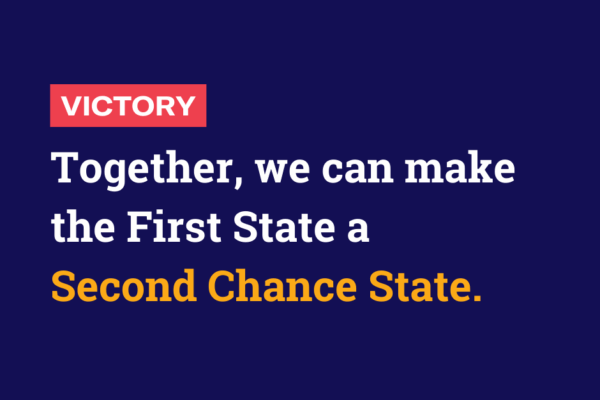DOVER, DE – On Friday, December 8, the Supreme Court of Delaware ruled that out-of-state conviction records should not bar individuals from seeking expungement of their otherwise eligible Delaware records. The Supreme Court held that the expungement statute’s “prior or subsequent convictions” language refers only to Delaware convictions, not convictions in other states.
In March, the ACLU of Delaware partnered with Reed Smith LLP to file an amicus brief in support of those seeking record clearance with out-of-state convictions. The brief argued that interpreting out-of-state records to be a complete bar to expungement eligibility would negatively affect the implementation of Delaware’s Clean Slate automated expungement statute—set to begin in August 2024—and cause inequitable, and potentially unconstitutional, outcomes. “Starting next August, more than 290,000 people will be eligible for automatic record clearance through Delaware’s Clean Slate process,” said John Reynolds, Deputy Policy & Advocacy Director at ACLU-DE. “The Court’s decision recognizes automated record clearance’s power to transform hundreds of thousands of lives and removes an unnecessary barrier so individuals eligible for the automated process can receive relief as quickly as possible.”
The Court’s decision notes the collateral consequences caused by records, as well as Delaware’s efforts to address this problem through recent reforms to expungement law and the passage of the Clean Slate Act in 2021. "Too many people in our communities return home after serving their time only to face perpetual punishment due to a record,” said Michael Bartley of HEADS UP 302 and the Clean Slate Delaware coalition. “The Supreme Court’s decision ensures that Delawareans that have done everything that’s been asked of them—reconnect with their families, reintegrate into their communities, and remain crime-free—can benefit from expungement and the automated Clean Slate process.”
Delaware is part of a national movement to expand access to second chances, with 12 states passing Clean Slate policies over the past four years. “There is a national trend to automate record clearance for those who have earned it, and the Delaware Supreme Court’s ruling affirms The First State's leadership status as an early adopter of this transformative policy,” said Jason Cooper, Vice President of Programs for The Clean Slate Initiative. “Partners throughout the state have worked for years to ensure that having a record is not a life sentence to poverty. Once implemented, Delaware’s Clean Slate law is well positioned to change people's lives and inspire other states to pass similar laws in the coming years.”
In its decision, the Court confirmed Delaware’s commitment to second chances and the powerful benefits that record clearance can provide. “Ultimately, our goal is to help remove unreasonable barriers for people who otherwise qualify for an expungement so that they are not barred from employment opportunities, affordable housing, financial assistance, or experience stigma and other limitations due to their criminal record,” said Eliza Hirst, Esq., Assistant Public Defender and Head of the Post Disposition Unit at the Office of Defense Services. “We are very pleased with the Delaware Supreme Court’s decision holding that out-of-state records are not necessarily a barrier to an expungement of a Delaware criminal record.”
Additional information about Delaware’s expungement laws, the Clean Slate automated expungement process, and how to get involved in the campaign can be found at Clean Slate DE’s hub page: cleanslatede.org.
For those interested in learning more about the Supreme Court’s decision and advocating to increase access to second chances in Delaware, HEADS UP 302 and the Clean Slate DE campaign are holding their next Community Solutions Meeting at 5:30pm on Tuesday, December 19 at the Kingswood Community Center, 2300 Bowers St., Wilmington, DE 19802.
Stay Informed
Sign up to be the first to hear about how to take action.
By completing this form, I agree to receive occasional emails per the terms of the ACLU’s privacy statement.
By completing this form, I agree to receive occasional emails per the terms of the ACLU’s privacy statement.


